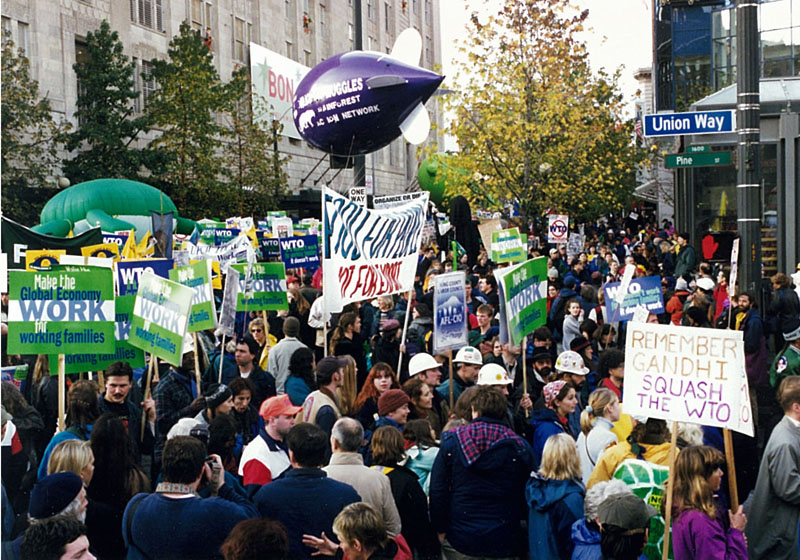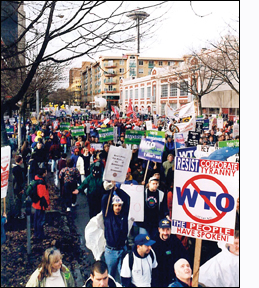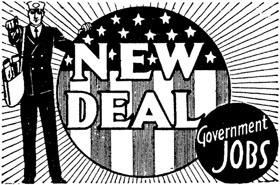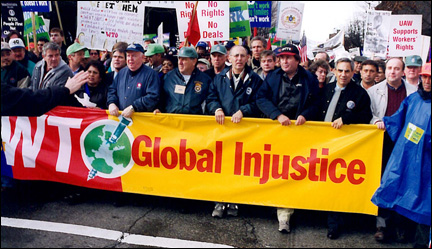OPINION
So, what was that WTO stuff about in 1999?
Join us this Saturday at WTO+20 commemoration events to explore its legacy
By STAN SORSCHER
(Dec. 3, 2019) — This week marks the 20th anniversary of the World Trade Organization protests in Seattle in 1999.
 I was in Seattle then, and I missed it. I didn’t understand the turtles, or the issue, really.
I was in Seattle then, and I missed it. I didn’t understand the turtles, or the issue, really.
What I did understand, quite vividly, was the dedication of 50,000 activists from the U.S. and around the world. I was inspired by their commitment to block intersections while police sprayed them with tear gas.
After the first day of protests, my daughter asked me if she could cut class at high school, and go with her friend to the protests. I said yes, you must go. This is history.
So, what about the WTO protests in 1999?
This question was considered last weekend in events at Town Hall in Seattle. And this coming Saturday, Dec. 7, we will take another look at WTO+20 commemoration events that include a rally at 10 a.m. in Occidental Park, workshops in the afternoon, and a keynote by Nobel Prize economist Joseph Stiglitz at Town Hall.
First, the protests meant thousands of activists and regular Seattle residents shared powerful experiences 20 years ago, which they’ve carried with them to today.

Second, it demonstrated that labor, environmentalists, faith organizations, and social justice groups had found common purpose.
Third, it gave courage to developing countries to reject a flawed vision of globalization that prioritized the interests of global corporations while reducing bargaining power for workers, communities, and the environment around the world.
Fourth, it transformed the issue of globalization into a social movement. From that point forward, presidents, Congress, and corporate sponsors of the WTO faced an aroused public. This is what democracy looks like, when social movements push lobbyists, industry associations, and establishment talking heads out of the way.
Twenty years on, our lived experience validates the message of the protests. The free-trade free-market neoliberal approach to globalization is exhausted, socially, politically, and economically.
Nobel Prize economist Joseph Stiglitz calls out 3 defining problems of our time; climate change, inequality, and political instability. Millions of workers and voters have lost trust in the way we’ve managed our domestic economy, and many feel even worse about the way we’ve managed the global economy. That malaise feeds deep mistrust of government, establishment leaders, and many of our social and political institutions.
NAFTA and the WTO were designed to please global corporations and the tiny fraction of society that has done well for the last few decades. NAFTA and the WTO were, then, and are still today devoted to the interests of global corporations. Millions of voters get that, in one way or another.
This won’t be fixed incrementally by editing a footnote for labor rights or by expanding the rights of corporations even farther in the new NAFTA, known as the United States-Mexico-Canada Agreement (USMCA).
 In our history, we have managed our domestic economy better. We could manage globalization better. Other countries are following better rules now.
In our history, we have managed our domestic economy better. We could manage globalization better. Other countries are following better rules now.
The defining problems of our time — climate change, inequality, and political instability — all have their origin in bad policies and rules that favor those with wealth and influence. Markets will not solve these problems. Markets have amplified these problems. Free trade policies fit hand in glove with the trickle-down policies of the last 40 years.
Stiglitz talks about collective action through government policies and people-powered movements. Germany and northern Europe have effective national strategies that serve their national interests. In our past we have invested in infrastructure, education, and research and development for the purpose of creating jobs in our communities and improving well-being generally.
A Green New Deal or a Green Marshall Plan would be national strategies, managed to serve our legitimate national interests.
If we move to coherent well-designed national industrial policies, we will need new trade policies. We will need global rules consistent with the social and political frameworks in each country.
Please join us Saturday, Dec. 7 to look back at 1999, see where we are now, and look forward to a better way to manage globalization:
10 a.m. rally at Occidental Park in Seattle, with Larry Brown from the Washington State Labor Council, Tefere Gebre Executive Vice President of the AFL-CIO, plus other local and national speakers, then a march to the Federal Building
3 to 6 p.m. workshops at Town Hall on labor, environment, public health, food security, immigration, indigenous peoples’ management of natural resources, data and eCommerce, people-powered movements, and militarism
7:30 p.m. at Town Hall Lori Wallach will give a brief history of trade activism, followed by a keynote by Joseph Stiglitz.
 Stan Sorscher is a board member of the Washington Fair Trade Coalition and a former labor representative for the Society of Professional Engineering Employees in Aerospace (SPEEA), IFPTE 2001.
Stan Sorscher is a board member of the Washington Fair Trade Coalition and a former labor representative for the Society of Professional Engineering Employees in Aerospace (SPEEA), IFPTE 2001.






